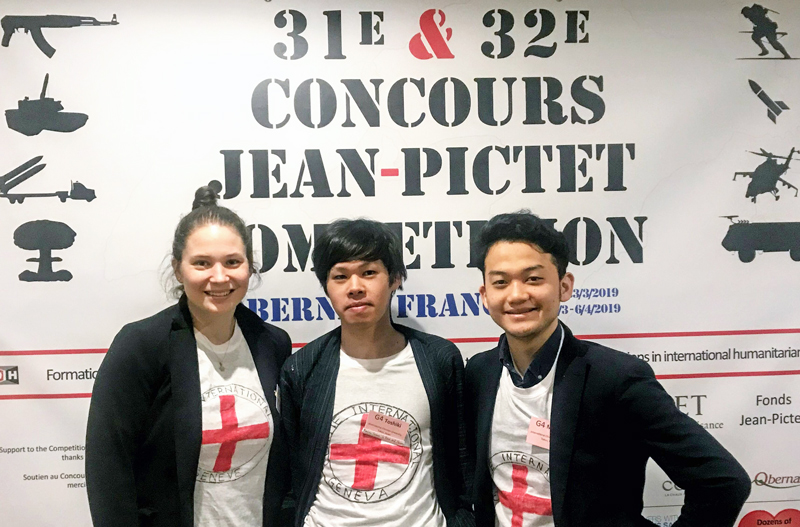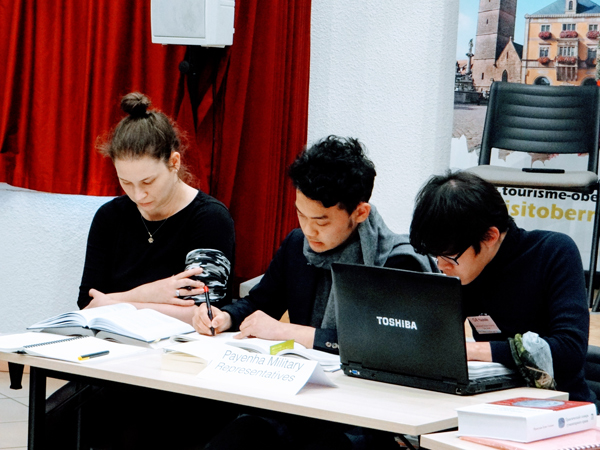ICU Student Wins Best Speaker Award at the 2019 Jean-Pictet International Humanitarian Law Competition
In April, three ICU students participated in the 2019 Jean-Pictet International Humanitarian Law Competition held in Obernai, France, and graduate student Kalika Kastein won the Best Speaker Award. The JICUF grant that their instructor Assistant Professor Hiromichi Matsuda was awarded was used to cover some of the cost of participating in the event. Below is a report from Kalika. Congratulations, ICU team!

From 30 March to 6 April 2019 an ICU team, composed of graduate student Kalika Kastein, and undergraduate students Toshiki Narushima and Makoto Fujioka, attended the 32nd edition of the Jean-Pictet International Humanitarian Law Competition. One member of the three-person ICU team, Rotary Peace Fellow Kalika Kastein, was awarded the Gilbert-Apollis Prize for the best speaker in the English section. The award is given to just two (one in the Anglophone and one in the Francophone section) of 150 participants in the competition and goes not just to the most articulate person, but to the person who most clearly demonstrates values such as teamwork, cultural-sensitivity, respect, and the ability to listen to others. The same team composed of Kastein, Narushima, and Fujioka placed in the semi-final round at the national ICRC Japan Moot Court Competition last year.
The commencement of the week-long competition held in Obernai, France, marked 17 years to the day since the competition’s namesake, Jean Pictet, passed away. Pictet, a legal scholar and an advocate for international humanitarian law, was one of the primary leaders in the adoption of the four Geneva Conventions which were formed around the concept that all wars have limits. These documents laid the groundwork for understanding today around the concepts like “protected persons,” such as the protection of medical personnel and civilians in times of war. The competition, which commemorates the work of Pictet, has been held every year since 1989 with the primary purpose “to take the law out of the books.” Teams are required to role play in a variety of different positions, from that of government legal advisors, UN delegates, ICRC representatives, NGO leaders, and members of either military or rebel groups.

ICU is the second school from Japan to participate in the Pictet and this was the first year that ICU sent a team to the competition. The team’s participation was graciously funded through support from the Japan ICU Foundation (JICUF). The team received extensive support in their preparation from Professor Hiromichi Matsuda, an ICU law professor; ICRC Tokyo; Mamiko Tomita, a programme officer with ICRC; as well as Dilton Ribeiro, Rotary Peace Fellow and current ICU graduate student. The team also received assistance from Christophe Lanord, the lead administrator and coordinator for the Pictet; and Guillemette Blanc, a competition tutor and former Pictetist.
Comment by the ICU Jean-Pictet team:
Signing the Universal Declaration of Human Rights is a practice that all ICU students undertake during matriculation. Yet, the impact of that commitment is something that we came to a deeper understanding of through our experience a part of ICU’s Jean Pictet team. Through the Jean Pictet competition, we were able to role play in the position of numerous parties to a conflict. Whether we were walking through the woods representing NGO staff in the field or sitting in a conference room as mock legal advocates, we had to think quickly to respond amidst a fictional conflict situation while upholding human rights in tandem with humanitarian law. Although in a privileged environment like ICU, it can seem like armed conflicts are distant, participating in the Pictet drove home how important it is for all of us as global citizens to advocate for principles like distinction and proportionality, and stand against unnecessary suffering, since legal precedent often shapes the future.
Being a part of a university founded on ideals of peace certainly contributed to our team’s positive performance. As one of the few schools consisting of non-law students in the English section, taking home the Gilbert-Apollis award demonstrates how the ICU team was able to work together to overcome a field of fierce competitors using our strong liberal arts backgrounds. Using empathy, compassion, and the knowledge gained from our diverse majors (peace studies, philosophy, and public policy) as liberal arts students we contributed another perspective to international humanitarian law beyond the knowledge and recitation of legal statutes. Our success is evidence of how ICU’s liberal arts education and peace-based approach prepares students to think critically and enact change.

Comment by Assistant Professor Matsuda:
The Jean-Pictet Competition is one of the most prestigious competitions in the field of international humanitarian law. Law students from all over the world learn how to cope with the humanitarian crisis through role-playing. This year, ICU students who took the graduate course “Law and Peace” participated in this competition for the first time.
This best speaker’s award demonstrates that ICU’s “legal education in liberal arts” is the top level in the world in terms of legal expertise, interdisciplinary knowledge, and cultural sensitivity. I thank JICUF for the warm support, and I am looking forward to encouraging more ICU students to participate in international competitions.



